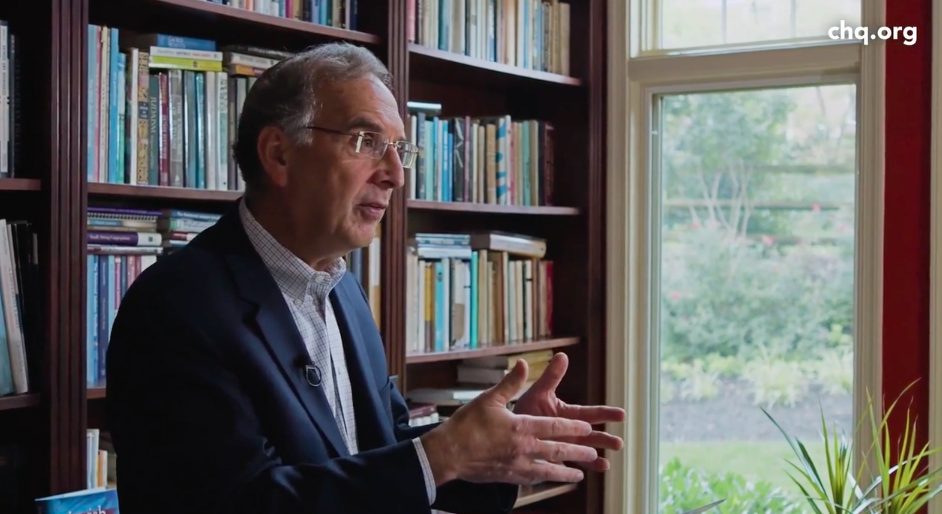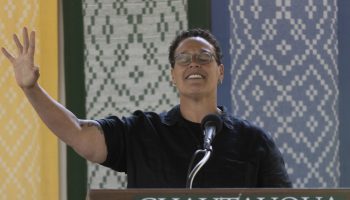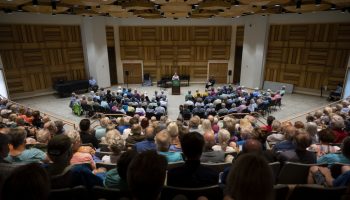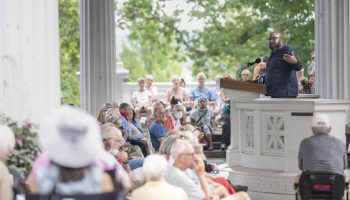
Before he began his Interfaith Friday lecture, Rabbi Sid Schwarz said his take on progressive Judaism was one of many.
“No one should be so arrogant as to think that their interpretation is the only interpretation and the intent of the Biblical text,” Schwarz said. “What I now offer is a Jewish take, because there is no such thing as the Jewish take. And don’t let anyone tell you otherwise.”
Schwarz gave his Week Eight lecture “The Creation Story and Humanity’s Homework: A Jewish Take” at 2 p.m. EDT Friday, Aug. 21, on the CHQ Assembly Video Platform. Vice President of Religion and Senior Pastor Gene Robinson joined him in a subsequent Q-and-A.
Schwarz has served as a rabbi for 40 years. Prior to Schwarz’s time as a senior fellow at the nonprofit Hazon, he founded and led PANIM: The Institute for Jewish Leadership and Values, and organized a historic protest against the former Soviet Union’s treatment of its Jewish citizens. He said that the understanding of creation for Jewish people is multifaceted.
“For Jews, interpreting the texts of the opening chapters of Genesis, or any passages in the Bible, are closer to one of those ‘Choose Your Own Adventure’ books that you might have bought for your kids,” Schwarz said.
These layered meanings are compounded by the traditional study of Rabbinic literature.
Schwarz said that progressive Judaism is not a common perspective within the broader faith. His parents were Holocaust survivors, and he grew up with the traditional idea of God as an all-powerful, omnipotent being. But when his uncle, who was also a rabbi, introduced him to the writings of reconstructionist Jewish thinker Mordecai Kaplan as a gift for Schwarz’s bar mitzvah, a young Schwarz agreed with Kaplan’s concept that religion should drive personal and community development.
I have always been drawn to this second image of God,” Schwarz said. “Not as a master of the universe, but as a force for personal, social transformation in the world. And this guy gives humanity homework because this guy cannot work alone.”
With Jewish thinkers spanning multiple centuries across the continents, Schwarz said reading the full breadth of Rabbinic literature would take several lifetimes to complete.
“If I, as a 21st-century rabbi, want to deliver my own interpretation on a verse, I stand on the shoulders of rabbis from generations who came before me who commented on the same verse,” Schwarz said.
Schwarz used two verses from Genesis to present two views of the task that God gave humanity. Genesis 1:28 and Genesis 2:15, depending on how they are translated, can connote that humans control the domain of the land on earth because God gave it to them, or that they must work in service to others, protect, and guard the land that God gave them.
Schwarz said that this dichotomy is reflected in the American debate over climate change. Climate change deniers often believe that if God is in control of the environment, humans should be able to build what they need without consideration of the earth because God will provide.
Schwarz believes in the second view of humanity: the idea that people are stewards of the earth for God.
“The world has been given to us as a sacred trust,” Schwarz said.
Schwarz said this reflects two competing perspectives on God in Judaism, as well as Christianity and Islam. One version of God is patriarchal and hierarchical, with divinely ordained justice from above.
The second version of God is a healer, in Psalm 147, and as a leader of the oppressed as described in Exodus 6.
“I have always been drawn to this second image of God,” Schwarz said. “Not as a master of the universe, but as a force for personal, social transformation in the world. And this guy gives humanity homework because this guy cannot work alone.”
Schwarz quoted a portion of the Talmud, which says that God didn’t create bread, but created wheat so humans could make bread. And rather than creating bricks, God created clay for humans to make bricks.
“Humanity is an integrative part of the unfolding of the creation of the universe,” Schwarz said.
This accounts for all humanity, not just a few. Genesis states that all humans are created in the image of God, which means that humans must treat each other as a fellow reflection of the divine.
“God is present in the world when human beings do their homework and decide to be God’s agent on Earth,” Schwarz said.




